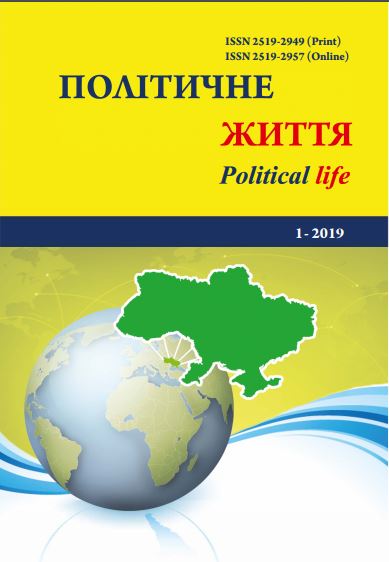Ecological Crisis as a Crisis of the Existing System of Values.
DOI:
https://doi.org/10.31558/2519-2949.2019.1.8Keywords:
ecological values, biosphere, consumerism, natural resources, strategic environmental initiativesAbstract
It has been discovered, that the current ecological crisis has far-reaching social-economic roots, even though it is mainly caused by the crisis of spirituality. The idea of all-encompassing control over nature is a fruit of arrogance and the result of the mind being polluted by an amiss idea that nature exists solely to provide comfort to man.
The research identified one of the most significant contradictions, which, for the most part, defines the essence of the environmental issue – the contradiction between the economic progress of mankind and the regeneration capabilities of the biosphere. It has been stated that the practical orientation strategy has led to consumerism, depletion of natural resources and the overall natural degradation. Attention is drawn to the particular danger brought upon by the phenomenon of consumerism, such as: in economic terms it is viewed as dangerous because, due to being limited in resources, nature is incapable of fulfilling endless material needs of mankind in any given moment; in geopolitical terms it causes increasingly aggressive behaviour in people, nations and countries in circumstances of limited resources; in moral terms it is due to the fact that focusing on being a fashionable and prestigious consumer leads to a person losing the understanding of the importance of the integrity of nature, and, as a result, gaining a distorted perception of oneself, as a person. For people like that clean air, water, soil and forests lose any significance, because their main values are – wealth, prestige, money and other similar amenities of the material world. This is the essence of the primitive consumeristic approach to life and nature.
The research draws a conclusion that the contemporary resource limitations of mankind are caused by the influence of certain social and cultural factors that can be affected by how the public life is organized. Lofty spiritual values should somehow regulate the daily living necessities and their differentiation. Humanity needs to rethink their place in the world structure in order to view a man not as the conqueror of nature, but rather as an organic part of its structure, which would, of course, mean radically changing the values, particularly those concerning the attitude toward nature. It is crucial to realize that the increase of welfare and living conditions on its own doesn’t make people happy. Modern mankind needs to review their traditional rational-pragmatic priorities, fundamentally increase the levels of morality and spirituality, and realize that in the process of using natural resources people are to gain not only the “daily bread” for our bodies, but also the “bread” for our souls. The research paper provides suggestions on the main changes to the vector of economic development, the so-called strategic environmental initiatives of humanity, that would at the same time become the bases for the shift of the moral paradigm of the mankind development, in which only the ecologically rational things would be considered economically rational.
References
Хилько М.І. Екологізація політики. К.: ВАДЕКС, 2014. 344 с.
Гоpелов А.А. Человек – гаpмония – природа. М.: Наука, 1990. 188 с.
Экологическая антология: Экологические произведения западных авторов. Сов.-амер. гуманитарная инициатива "Голубка"; Редкол.: Г. Уорнер и др. М.; Бостон, 1992. 267 с.
Алексеенко И.Р., Кейсевич Л.В. Последняя цивилизация? Человек. Общество. Природа. К.: Наукова думка, 1997. 411 с.
Кисельов М. М. Методологія екологічного синтезу: єдність людино- та природоохоронних аспектів. К.: Наукова думка, 1995. 158 с.
Булатов М.О. Фiлософiя ноосфеpи (Фiлософський змiст i сучасний смисл феномена ноосфеpи).
К.: Наукова думка, 1995. 149 с.
Маєр-Абіх К.М. Повстання на захист природи. Від довкілля до спільно світу. Київ: Лібра, 2004. 196 с.
Морен Е. Шлях. За майбутнє людства. К.: Ніка, 2014. 256 с.
Крисаченко В.С. Екологічна культура: теорія і практика. К.: Заповіт, 1996. 352 с.
Гоp Эл. Земля на чаше весов (экология и человеческий дух). М.: Пpоза, поэзия, публицистика, 1993. 432 с.

